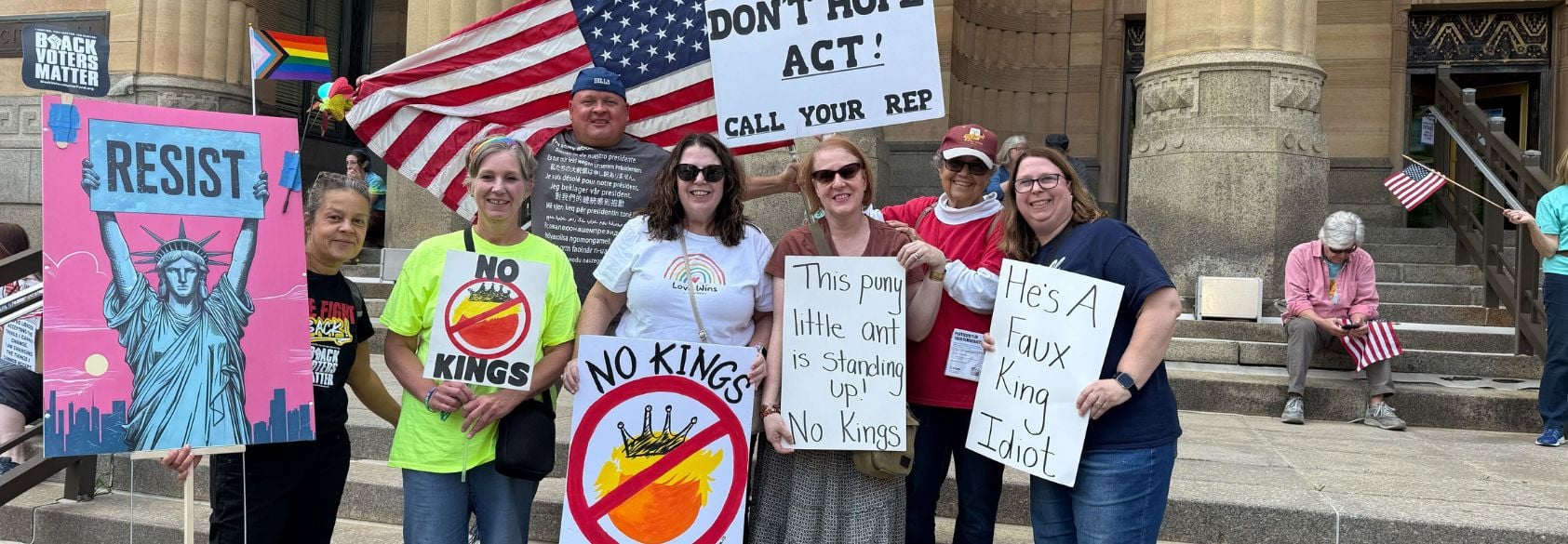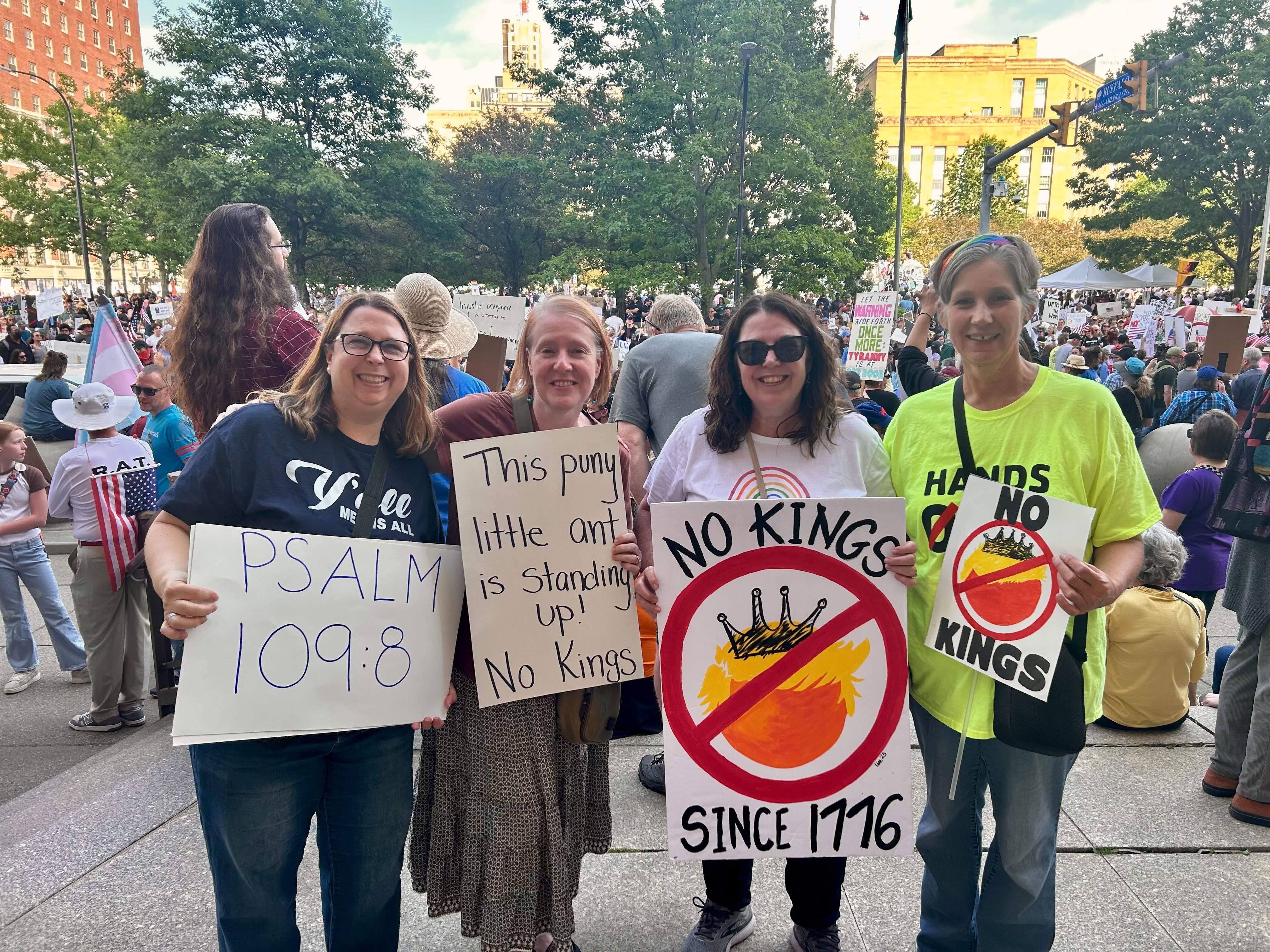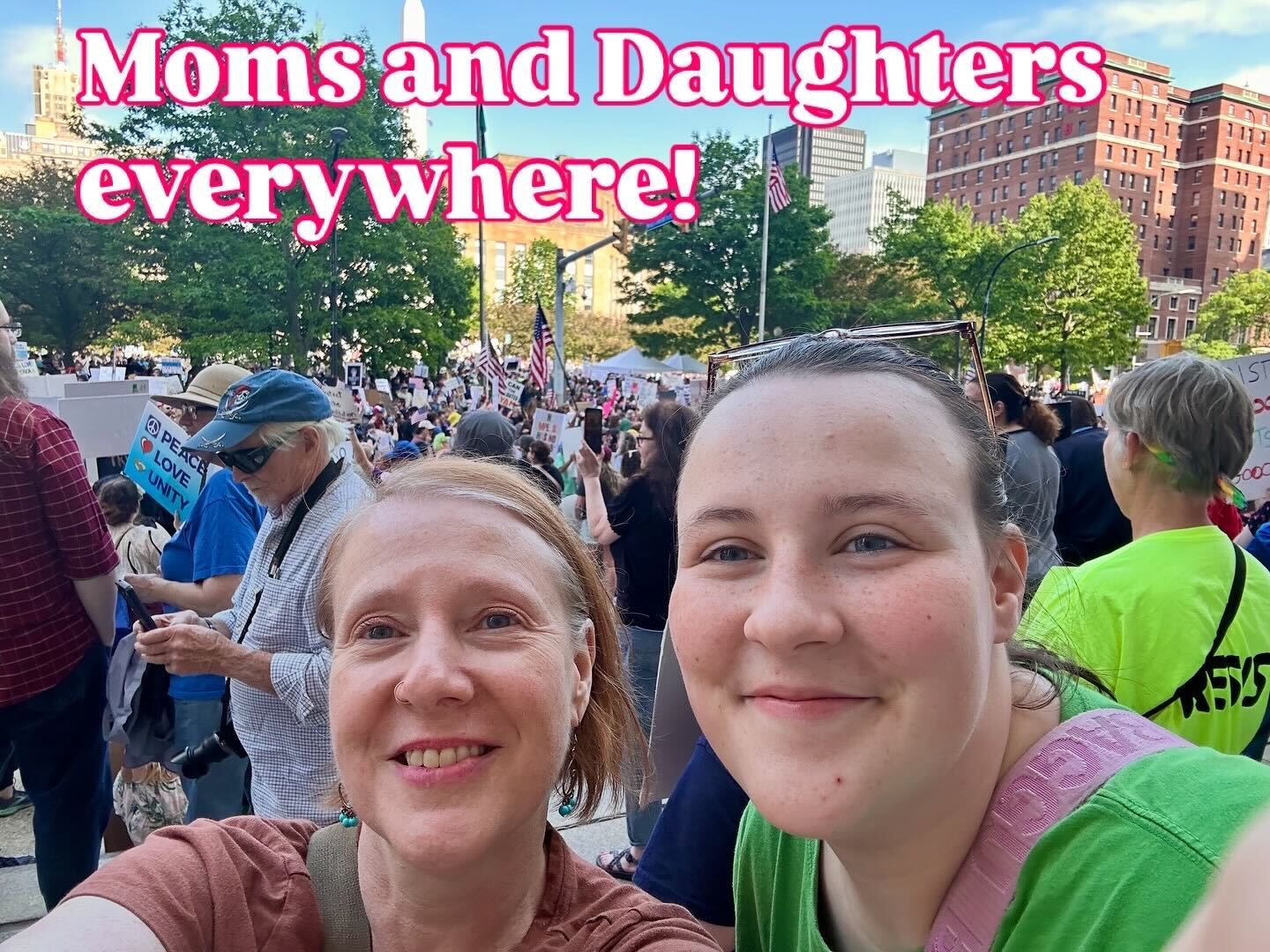No Kings Day: This Is What Democracy Looks Like
On No Kings Day, Amber Chandler finds hope and purpose through protest, community, and the power of showing up—reminding us what democracy can look like.

What does standing up for democracy look like in your community—and who’s standing with you?
Share
June 18, 2025
On No Kings Day, Amber Chandler finds hope and purpose through protest, community, and the power of showing up—reminding us what democracy can look like.
Share
I wasn’t going to go. I’d been excited about No Kings Day, but I was feeling anxious the closer we got to it. I’d written about how exciting and important it is to take collective action just the week prior. However, my family had an interesting conversation the night before, and we debated potentially putting ourselves in harm’s way, what difference one person can make, and the fear that paralyzes us. I showed them a picture that had shown up on my feed. It said, “We weren’t designed to process global tragedy at breakfast, respond to work emergencies at dinner, and fall asleep doomscrolling at night. Our nervous systems never consented to this arrangement.” We’d all been fighting overwhelm and despair. On No Kings Day, I woke up feeling anxious. I really wanted to go. I was going to be mad if I didn’t, but I know how divided things are right now, and I was scared for my safety. However, this was nearby in Buffalo, N.Y., and I’d be among other community members--at least ostensibly. My best friend and co-teacher, Laura, was going to meet up with one of our retired friends, so my daughter, Zoey, and I decided to tag along. I’m so glad we did, for a bunch of reasons. Here are some of them.
In making my decision, I asked myself, “Do I want to be the kind of person who sits back and watches terrible things happen and not do anything?” There are plenty of legitimate reasons not to participate in collective action like this, but none applied to me. I’ve always stood up for what I believed in, but the violence in Los Angeles made me both nervous and more determined to do something simultaneously. My college bumper sticker, “Silence is the Voice of Complicity,” was haunting me.
I have been thinking a lot lately about the irony in making vet appointments, getting pedicures, grading papers, and watching movies while living in what seems to be the end of democracy. My daughter and I both keep referencing The Handmaid’s Tale, by Margaret Atwood, but I’ve honestly been too anxious to re-read it. I’ve been looking through my old copy though, marveling at the marginalia and the underlined passages, longing for a time, not so long ago, when I did not know the fear and feelings of helplessness the way I do right now—a time when fiction was fiction, not a mirror of my reality. When I found this passage, I knew that I could not be among those who did not fight against and fight for: “That was when they suspended the Constitution. They said it would be temporary. There wasn't even any rioting in the streets. People stayed home at night, watching television, looking for some direction.” I’ve been floundering, like so many others, hoping for direction. No Kings Day was just what was needed to wake us all from our channel surfing and constant scrolling, marveling at what else terrible Trump would say or who else was being targeted. Instead, we found direction.
Do I want to be the kind of person who sits back and watches terrible things happen and not do anything?
One of the best things about the No Kings Day rally was the signs. Though I didn’t know the people who were marching and chanting with me, I’d see a sign that spoke to me, and I’d know that we were kindred spirits, or at least like-minded, and wow, did that feel amazing. One of the signs that cracked me up in that completely relatable way was one that said: “Protesting is the new brunch. See you next week.” There were so many people at our particular rally in Buffalo who definitely carried AARP cards; so, it was not hard to imagine them brunching. My daughter is 20, and she noted that her demographic made up probably less than 5 percent of the participants. There are lots of reasons why that might be true, but it was amazing to see the older crowd lead the way. They had the best signs, loudest chants, and their hands flew up in a V whenever they saw a friend across the way. I got to eavesdrop on some gray-haired men reminiscing about other times they’d protested, and the gravity of this day began to sink in. What if No Kings Day was a day we’d all look back on as the beginning of an ending, and the start of something brand new, less partisan, and wholly safe for everyone to exist in the pursuit of happiness?

My friend, Lisa, commented, “It’s just nice to be able to talk freely.” We’ve all become so guarded. Community is harder to come by these days, as politics and screens both have alienated us from each other. It was not lost on me that the best I’ve felt in a very long time was being surrounded with other people, outside, away from the doomscrolling. Instead, I became a part of something so much bigger than myself. That is what has been missing, at least for me, since the election. I had experienced such a flow of goodwill and common purpose during the election—sending out hundreds of postcards, helping people make voting plans, and subsisting on hope. Through the winter, despair did creep in, but No Kings Day ignited something in me and the rest of the country (even the world!). It reminded me that one puny little voice, when combined with others, is amplified and must not be ignored.

Another reason I’m glad I participated in No Kings Day was witnessing the power of female friendships. I’ve never thought so much about this, but Zoey brought it up as we were walking back to my car after dinner. In our group, there were three mother/daughter pairs spanning all ages, as well as a sister-in-law, and my very best friend. I had never met a few of these women, yet when it was time to go, we were hugging goodbye. I think we underestimate the power of touch and how much we lose when we become isolated and in despair. Zoey was clearly impacted by the event; she had never done anything like this before. She said, “Girls can change the world. We are just all girls. We don’t need to wait on anyone to save us.”
She’s lucky to have amazing friends at college, and she knows the role my “girls” play in my life. As she turns the corner into adulthood, I’m glad that she is one of my “girls” too. None of us are biased against men as a whole; however, we “girls” are seeing a return to “traditional values,” ones that don’t include agency for ourselves. So, it is not all men, of course, but another Atwood quote comes to mind, “Don’t let the bastards grind you down.”

The reason I wanted to share these reflections is because I have felt ground down. Diminished. Less than. Silenced. These have been heavy words hanging around my neck, like a placard that I could not see myself. I needed to see others like me, to see their placards—their signs—to know that my fear and confusion and despair have been valid, but also to see that the individual does have power, when we are able to come together and exorcize the despair with voices in unison: “This is what democracy looks like!”
Share your pictures from No Kings Day, and check out these resources:
Want to see more stories like this one? Subscribe to the SML e-newsletter!
